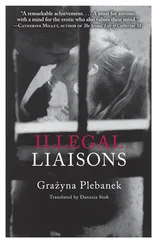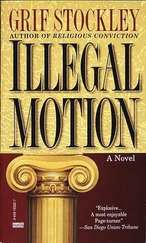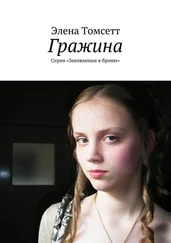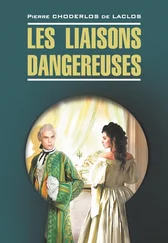Grażyna Plebanek
ILLEGAL LIAISONS
For Halina, Anka Ś., Jan, Wojtek, Maciek
HE WOULD HAVE RUN THE RELAY – work, home, family – without stopping, had not the old edifice squeezed between insignificant buildings allowed stained-glass light into his soul. Jonathan enters the church and feels the sickly-sweet smell of candles rouse his sleepy cock. She is already there.
Jonathan pauses, his knees weak. The girl is walking down the row of pews toward him; he sees the outline of her slender figure in the semi-darkness, her long hair flowing in a movement rarely seen in this world. Jonathan does not get caught up in lame comparisons because the smell, warmth, and outline of her breasts beneath the blouse and her long legs – not the most shapely yet disarmingly coltlike – below her skirt, enfold him just as the girl – woman really, yes, true woman – plants a kiss on the corner of his lips.
“Hellish idea,” thinks Jonathan, pressing the lemon-scented body to him. Meanwhile his hands move up and close over her taut buttocks.
“Communion of bodies,” thinks Jonathan.
“Andrea…”
And in his mind he adds, “May it last forever.”
When he returns from Ixelles one and a half hours later, speeding the car in his mind, he feels more powerful than the four-year-old Toyota. He would readily ram a hole in the floor with his foot and get home by the Flintstones method; bubbles of joy burst with a silent “puck” until Jonathan bursts into laughter.
He keeps recalling the last hour over and over again.
The prelude: he and Andrea leave the church, bodies rubbing against each other. They climb into his car; Jonathan switches on the indicator and joins the line of cars. The gear lever is in his way as his hand hurries to slip beneath the passenger’s skirt. When he reaches the strip of skin above her stocking, Jonathan gasps. He miraculously overtakes a motorcyclist and slips his hand between the girl’s thighs. He is nearly in the place he wants to be.
Although, in truth, the prelude was different. Just as he was going out to meet Andrea, Megi leaned out of the kitchen.
“Jonathan? Get some money from the cash machine on your way back from the gym, will you?”
He nodded, adjusted the gym bag on his shoulder, and was gone. An expression of indifference, an intake of breath as though he could roll up the scent of eau-de-cologne trailing after him and squeeze it into his gym bag, as far away from his wife’s nose as possible.
He quickly pushed the front door open and stepped out into the street. A last inquiring text and the screen flashed in reply – she, Andrea, was already waiting for him.
The voices of his children reached him from the window. Jonathan hunched his shoulders and walked briskly to the car. His daughter had almost given him away once, when she had asked why he was wearing his best T-shirt to the gym – the one Megi had bought him in New York. Another time his son had cuddled up to him and, stroking his clean-shaven cheek, had asked, “What’s happened to your prickles, Daddy?”
Jonathan threw the gym bag onto the back seat and drove toward avenue Emile Max. The blossom on the trees was splendid, some white, some cherry-colored; fallen petals covered the street in a damp carpet, lined the bends in the road, camouflaged the dirt. When, the previous day, he had passed this way with his children, Antosia had removed her shoes and run barefoot while Tomaszek had run over the froth of blossom with the wheels of his bike.
Jonathan had promised himself that he would photograph the trees before the petals fell. He had, of course, forgotten and now he had only one day, two at most, to capture this fragile beauty.
He drove and tiny, everyday recollections pecked at his memory. He passed the roundabout, parked in a side street behind the church and got out of the car. He was on edge. If only the smallness of family life would let him go! He had come here to meet his lover.
The apartments on Dailly Square basked in the warmth of the setting sun as he returned from meeting Andrea, and a lipstick-red blaze colored the roof tiles. Jonathan turned right and parked in front of his house. He grabbed the handles of his gym bag and cast a searching glance over the interior of the car: the children’s seats were covered with biscuit crumbs, an empty juice carton lay in the middle, a forgotten drawing – everything looked as it should.
The smell of dinner reached him at the threshold. His wife had not had time to change after work. She was wearing slippers but beneath her apron was a suit skirt from which dangled a “leash” – an identity tag for entry to the European Council. It crossed his mind that Megi was a modern wife: aromas from the kitchen did not overpower the smell of ebonite that usually surrounded her when she came home from work, an aroma characteristic of office-workers who spent their days at a computer.
Jonathan smelled of another woman so he darted upstairs.
“Did you get the money from the cash machine?” – the question stopped him when he was already at the top. He slapped his forehead; Megi pursed her lips. Jonathan turned and locked himself in the bathroom.
Throwing off his clothes, he smiled at the mirror. Before stepping into the shower, he licked the taste of his lover from his fingers.
THEIR START IN BRUSSELS, two years ago – one of many beginnings, which were not really the beginning of anything but served as convenient memory props. The recollection of two small keys handed over to them by the owner of the apartment – Jonathan had gazed at them in amazement. He thought that the rooms – almost four meters high, with arched, vaulted, and palatial windows ending in intricately grated panes – deserved the kind of keys that dangle from a witch’s belt in fairy tales.
Megi locked the empty apartment and slipped the keys into her handbag. They made a round of “their” new area, stopping at the window of a pharmacy, at a display where keys and glass are cut. They picked up a take-out menu from a Chinese restaurant and sat down over coffee at the café in the square.
“Café au lait, s’il vous plaît,” Megi ordered.
“Lait russe,” the waiter corrected with a smile.
Megi glanced meaningfully at Jonathan but he was not looking at her. Elderly people sitting at the neighboring tables (later he found out that there was an old people’s home around the corner) were reading French newspapers; the waiter took orders in Dutch; a guttural Arabic followed the children who had laid siege to the playground beyond the trees. The wind played with the folds of the long garments worn by Arab women pushing prams, and licked the chocolate bellies of black mothers followed by the eyes of Polish workers.
“Did you hear that? They call coffee with milk ‘Russian milk,’” Megi’s voice broke through the multilingual hubbub.
Jonathan smiled absentmindedly. He had forgotten what beautiful backsides black women had!
Jonathan had known from early childhood that journeys meant parting. His mother had first left when he was seven years old. She had been offered a placement in England and disappeared from his life for a couple of months. At the time, it had seemed she had left for good.
One day he had gone to see her with his father. The visit had flown by so quickly that he didn’t remember any of it; yet he had never forgotten the parting. They had stood at the departure desk in the airport. Jonathan, who held on to his mother’s hand as hard as he could, had felt she did not want to let him go. His father had stood nearby clearing his throat pointedly now and again, but Jonathan had ignored him. His mother, too, had not let go; she looked as though she wanted to incinerate herself.
Читать дальше













